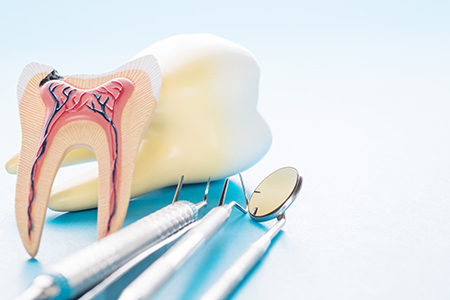Se habla español | We treat emergencies
1250 W. Lake St, Unit #20, Addison, IL 60101Se habla español | We treat emergencies
1250 W. Lake St, Unit #20, Addison, IL 60101
If a dentist tells you a tooth needs a root canal, there’s no reason to panic. Modern root canal therapy is a predictable, routinely performed procedure designed to stop pain, remove infection, and keep your natural tooth functioning for years to come. In many cases it’s the conservative choice when compared with removing a tooth and replacing it later.
At the office of Addison Dental Studio, our approach combines careful diagnostics with gentle techniques so patients can expect efficient treatment and clear guidance throughout the process. We focus on minimizing discomfort, protecting surrounding tissues, and restoring the tooth so you can return to normal chewing, speaking, and smiling.
Keeping your natural tooth is usually the healthiest option for your mouth. A tooth with an intact root helps maintain jawbone volume and supports neighboring teeth, which preserves chewing efficiency and facial structure. Root canal therapy addresses disease inside the tooth without the need for extraction whenever the remaining tooth structure and bone support are adequate.
Success rates for contemporary root canal treatment are high, thanks to improved instruments, sterilization techniques, and precise radiographic imaging. These advances allow clinicians to thoroughly clean and seal the internal root system while preserving as much natural structure as possible. When properly performed and followed by an appropriate restoration, treated teeth can remain functional for many years.
Choosing root canal therapy is often a balance between removing only the unhealthy tissue inside a tooth and providing a durable restoration afterward. Your dentist will evaluate factors such as the amount of remaining tooth, the condition of the root and surrounding bone, and whether a crown or onlay is needed to protect the tooth long-term.

Each tooth contains a core of soft tissue—the dental pulp—composed of nerves, blood vessels, and connective tissue. This pulp is essential during tooth development but is not required for a mature tooth to function. When decay, a deep fracture, or repeated dental work breaches the protective outer layers, bacteria can reach the pulp and cause inflammation or infection.
At first, you may notice increased sensitivity to hot or cold, or intermittent discomfort when biting. Left unaddressed, the infection can advance to the root tip and surrounding bone, producing swelling, persistent pain, or drainage. In some cases, a tooth can become discolored as the internal tissues break down.
Prompt evaluation is important because early intervention often preserves more tooth structure and prevents the infection from spreading. Diagnostic tools — including digital X-rays and clinical testing — help determine whether pulp therapy is indicated and allow your dentist to plan a predictable, minimally invasive treatment.
Not every toothache requires a root canal, but certain patterns and symptoms are common indicators that the pulp may be compromised. Paying attention to these signals and scheduling an exam without delay helps reduce the chance of more extensive complications.
Below are several signs that justify prompt evaluation. If you experience any of them, your dentist can assess the tooth and recommend the most appropriate treatment.
Pain that lingers, wakes you at night, or intensifies when lying down often points to deep decay or pulp irritation. Unlike brief sensitivity, this type of discomfort typically requires clinical assessment and may benefit from root canal therapy to remove the source of pain.
Short-lived sensitivity is common and usually reversible, but prolonged or severe responses to temperature changes can indicate irreversible pulp damage. These sensations may intensify when consuming hot drinks or cold foods and suggest that the nerve inside the tooth has become inflamed.
If biting down produces sharp pain or lingering soreness, the stress may be irritating the inner tissues or signaling a crack that exposes the pulp. Pressure-related pain often accompanies inflamed pulp or a developing infection at the root tip.
A gradual change in a tooth’s color can reflect internal changes after trauma or chronic pulp injury. While discoloration alone doesn’t always mean infection, it’s a common companion to pulpal degeneration and should prompt a dental review.
Structural damage from an accident or bite forces can expose the pulp or allow bacteria to enter, increasing the risk of irreversible inflammation. Treating the pulp and then restoring the tooth helps prevent recurrent problems and further breakdown.
Swelling near a tooth or a small bump on the gum (a sinus tract) can indicate that infection has reached the root tip and is draining. These signs call for prompt attention to address the infection and protect neighboring structures.
When infection affects the supporting bone, the involved tooth may feel loose or shift slightly. Successful root canal therapy, combined with appropriate restoration, often helps resolve inflammation and stabilize the tooth as healing occurs.

Root canal therapy today is performed with an emphasis on comfort, precision, and infection control. After a thorough exam and imaging, your dentist will numb the area with local anesthesia so the procedure is comfortable. Rubber dam isolation helps keep the tooth dry and prevents saliva from contaminating the treated canals.
The dentist will create a small opening in the crown of the tooth, gently remove diseased pulp tissue, and clean the canals using specialized instruments and irrigants to disinfect the internal spaces. Once the canals are shaped and cleaned, they are filled with biocompatible material to seal them and prevent reinfection.
In many cases, a root canal can be completed in a single visit; however, larger or more complex infections sometimes require two appointments. If necessary, a medicated dressing may be placed between visits to control infection. Your clinician will explain the timeline and coordinate the follow-up restoration, which is essential for long-term success.

After treatment you can expect some tenderness and mild soreness for a few days as surrounding tissues recover. These sensations are usually manageable with over-the-counter analgesics and diminish quickly. Follow any post-operative instructions from your dentist and contact the office if pain persists or you notice increasing swelling.
Root canal–treated teeth should be restored with a permanent crown or appropriate restoration in a timely manner. The remaining tooth structure can be more susceptible to fracture until it is fully rebuilt, so completing the restorative phase helps restore strength and function.
Long-term success depends on good oral hygiene and routine dental visits. Brushing, flossing, and regular professional examinations allow your dentist to monitor the treated tooth, check the integrity of the restoration, and address any concerns early.
Addison Dental Studio is committed to providing clear explanations and careful treatment planning for patients who need pulp therapy. If you’re experiencing symptoms described here or have questions about whether root canal therapy is right for you, please contact us for more information and guidance.
A root canal procedure is the best way to save a tooth that has been damaged by decay or injury and preserve your natural smile. The alternative is an extraction and treatment to replace the tooth. While at times a tooth is non-restorable and an extraction is the only option, when possible, it’s best to try and save your natural tooth. With proper care, a tooth with root canal therapy can serve your smile well for many years to come.
Despite lingering myths from before the age of modern dental anesthesia and technology, having a root canal procedure today is as routine and comfortable as visiting the dentist for a filling. While the procedure is performed under local anesthesia with your tooth completely numbed, we can also discuss options in dental sedation.
Whether the symptoms of a dental infection subside after a course of antibiotics, a draining abscess provides you with some temporary pain relief, or a tooth with radiographic evidence of pathology has not yet developed symptoms, it’s essential, before an infection worsens or occurs, to have a root canal procedure performed. In this way, the tooth can be disinfected, filled, and sealed to protect your health and avoid further problems.
If you have sustained a dental injury, have a toothache, jaw pain, swelling, or are experiencing any other unusual and uncomfortable oral symptoms, contact our office immediately for care. Dental problems that have not been evaluated and treated can significantly worsen, producing more severe damage and consequences for the involved teeth, your oral health, and even your overall wellbeing. Once you get in touch with our office, our friendly and compassionate office team will get you in for care at your earliest convenience.
While some root canal procedures can be completed in one visit, others may involve 2 or 3 appointments. How long it takes depends on various factors, including active infection, the number of canals in the tooth, and the tooth’s location or anatomy.
With a success rate that exceeds 95%, root canal therapy remains the most effective procedure to save a tooth in which the inner vital tissues have been damaged. However, as with all healthcare procedures, there are a small percentage of cases where the teeth become symptomatic a second time. The good news is that many of these teeth can still be saved with root canal retreatment or a minor surgical procedure known as an apicoectomy.
The best ways to maintain a tooth with root canal therapy are to get the proper restoration required to rebuild and protect the tooth, maintain proper oral hygiene, and schedule appointments for routine dental checkups and care.
Saving a tooth with root canal therapy is a wise investment that, in the long run, is typically less costly and invasive than having the tooth extracted and replaced with a fixed bridge or implant. As far as the exact cost of care, it can vary depending on which tooth is being treated. Many dental insurance plans provide coverage for root canal therapy. At the office of Addison Dental Studio, we do our best to optimize your dental benefits and minimize your out-of-pocket expenses. Our staff will answer all your questions about the cost of care and discuss all your payment options.
At the office of Addison Dental Studio, we use the latest technology and most effective methods of care to provide precise and gentle care. Our reputation for excellence is based upon a consistent record of achieving successful treatment outcomes while providing prompt, stress-free, and convenient treatment for every type of dental need.
Quick Links
Contact Us